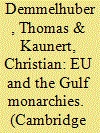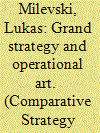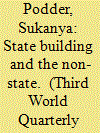| Srl | Item |
| 1 |
ID:
134278


|
|
|
|
|
| Summary/Abstract |
The Persian Gulf region is of strategic importance to the European Union (EU). Yet, different political realities of authoritarian government in the Gulf challenge crucial parts of EU foreign policy that are based on normative power Europe concepts. Cooperation with the ruling dynasties appears beneficial for EU decision-makers if one looks at the comprehensive agenda of common interests in the Gulf region. In 2004, the EU aimed to build a strategic partnership with the Mediterranean and the Middle East; in this the EU emphasized its commitment to advancing its partnership with the Gulf countries. Yet, from the perspective of 2012 the results are bleak. Despite some signs of improvement in deepening the political, economic and security interactions with the region, there is still no concerted EU policy in the Gulf beyond the thriving bilateral activities of some EU member states. The events of the Arab Spring have increased the challenges even further. The EU, on the one hand, is trying to support forces of liberal and democratic reform in some neighbouring countries. On the other hand, it seeks close partnerships with authoritarian family dynasties in those Gulf countries in which a democratic opening is not around the corner. This article suggests an alternative explanation for this dichotomy. While there is an inherent tension between the EU's reformist agenda and its own interests, whether security or trade interests, this article argues that much of the EU's relationship with the Gulf countries can be explained through a misperception of the specific settings of government in the region. Despite a substantial agenda of interests on both sides in areas such as trade, energy, regional security, terrorism and irregular migration, the EU's foreign policy outputs remain rather limited.
|
|
|
|
|
|
|
|
|
|
|
|
|
|
|
|
| 2 |
ID:
134651


|
|
|
|
|
| Summary/Abstract |
This article examines the relationship between two concepts in strategic studies, grand strategy and operational art, to consider their aggregate effect on the fundamental concept of strategy. Grand strategy as a higher level of strategy fails to account for the entire ends-ways-means logic of strategy, thus requiring the introduction of another concept to compensate. Parallels are drawn between this conceptual dichotomy and the current practice in modern civil-military relations. Its conceptual division into two other distinct ideas is counterproductive to the fundamental task of strategy, although its practice is necessarily divided.
|
|
|
|
|
|
|
|
|
|
|
|
|
|
|
|
| 3 |
ID:
136464


|
|
|
|
|
| Summary/Abstract |
This article unpacks the relationship between state building and the non-state. While accepting both the positive and corrosive characteristics of non-state actors and informal practices of governance, it attempts to (1) advance an argument in favour of mainstreaming ‘non-state’ forms that are positive and useful for state building; and (2) highlight the tensions between the practice of state building and the reality of the non-state. In thinking beyond the state and non-state dichotomy, the article seeks to identify factors that are necessary if state-building programmes are to work in complex environments. Drawing on received wisdom from recent experiences, this conceptual study focuses on important contextual, local, political and legitimacy issues to highlight prominent dilemmas. The conclusion suggests four policy-relevant lessons that reinforce the argument in favour of mainstreaming the non-state agenda into the critical thinking about security and development.
|
|
|
|
|
|
|
|
|
|
|
|
|
|
|
|